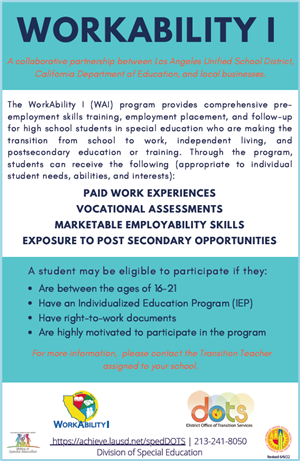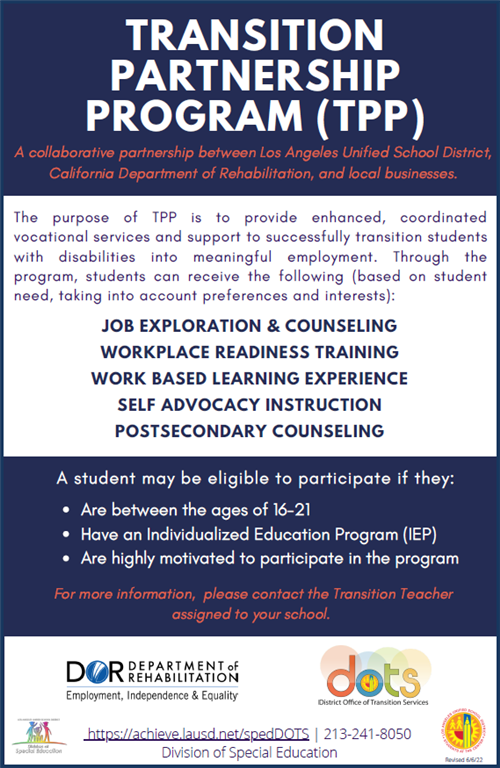- Los Angeles Unified School District
- New SpEd DOTS
-
Transition Resources

According to IDEA (Individuals with Disabilities Education Act):
“Transition services means a coordinated set of activities for a child with a disability that:
1) Is designed to be within a results-oriented process, that is focused on improving the academic and functional achievement of the child with a disability to facilitate the child’s movement from school to post-school activities, including postsecondary education, vocational education, integrated employment (including supported employment), continuing and adult education, adult services, independent living, or community participation;
2) Is based on the individual child’s needs, taking into account the child’s strengths, preferences, and interests; and includes: i. Instruction; ii. Related services; iii. Community experiences; iv. The development of employment and other post-school adult living objectives; and v. If appropriate, acquisition of daily living skills and provision of a functional vocational evaluation. 5.2.2017"
The following resources are intended to assist youth with disabilities as they transition from school to adult life. Resources reflect national research and best practices in the area of transition:
-
Options for After High School
- What will you do after high school? Let's look at options!
-
Click on each of the tabs below to learn more about each option.
- College
-
COLLEGE
An educational institute that provides higher education in a specific area of study to obtain a bachelor's or associate's degree (some also offer certificate programs). Access the web links for more information.
> Find the Right College for You
> Student Support Offices for Students with Disabilities: Students with disabilities will find that many colleges are equipped with offices that address accessibility, accommodation, and assistive technology for a diverse range of needs and may provide specialized support in advocacy, support, and academics. Click on the links below to access lists of student support offices for students with disabilities.
 California State College Student Support Offices for Students with Disabilities
California State College Student Support Offices for Students with Disabilities University of California (UC) Student Support Offices for Students with Disabilities
University of California (UC) Student Support Offices for Students with Disabilities  California Community College Student Support Offices for Students with Disabilities
California Community College Student Support Offices for Students with Disabilities California Department of Education Transition Resources for Education
California Department of Education Transition Resources for Education
Resources and guidelines for educators, parents and agencies that will assist transition age youth identify and move toward their postsecondary goals in education and/or training. National Center for Education Statistics’ College Navigator
National Center for Education Statistics’ College Navigator
Research the nation's colleges - all in one place. Search for institutions by using broad criteria such as school name, geographic location, and programs and majors. - Training Programs
-
TRAINING PROGRAMS
A career or technical school that provides hands-on training to earn a certificate, degree, or diploma in a variety of fields. Apprenticeships are also an option to earn while you learn.
LAUSD provides career training through Career Technical Education (CTE) programs. Industry professionals with years of real-world, on-the-job experience prepare CTE students for entry-level employment, career advancement, and industry certification.
 LAUSD Division of Adult and Career Education
LAUSD Division of Adult and Career Education
Offers English as a Second Language (ESL), High School Diploma & Equivalency Options, Apprenticeships, and Career Training Programs California Department of Education Transition Resources for Education
California Department of Education Transition Resources for Education
Resources and guidelines for educators, parents and agencies that will assist transition age youth identify and move toward their postsecondary goals in education and/or training. - Military
-
MILITARY
Training and work experience are available from six service branches: Army, Marine Corps, Navy, Air Force, Space Force, and Coast Guard.
- Employment
-
EMPLOYMENT
Begin working in an entry level position. There are a wealth of job seeking resources and services to assist job seekers with no-cost training, job placement, and job hunting.
Career Exploration Tools
• California Career Zone: a platform designed to help explore, plan, and prepare for a career you will love.
• Career One Stop: career, training, and job search website for the U.S. Department of Labor. The website serves job seekers, businesses, students, and career advisors with a variety of free online tools, information and resources.
• Career Outlook: articles from the Bureau of Labor Statistics that provide data and information on a variety of topics including occupations and industries, pay and benefits, and more.
• Education Pays Chart: helps visually understand the value of an education.
• California Career Center: a career planning website with tools to help map your future, whether looking ahead to college, apprenticeship, the military or other options.
• My Next Move: an interactive tool for job seekers and students to learn more about their career options.
• O*Net OnLine: an online database that contains hundreds of job definitions to help students, job seekers, businesses and workforce development professionals to understand today's world of work
• Talent Knows No Limits: a California public education resource for the employment of people with disabilities.
• Road Trip Nation: video interviews designed to help students choose career paths after listening to stories from leaders across hundreds of industries
Job Search Resources
• Employment Development Department (EDD): provides many resources for job seekers (including veterans, youth, dislocated workers, and people with disabilities)
• American Job Center: helps people search for jobs, find training, and answer other employment related questions.
• Job Seeker Resources from the Employer Assistance and Resource Network on Disability Inclusion
• Finding a Job That's Right for You
• Applying for Federal Government Jobs
• CalJOBS includes employment tools for job seekers in California
• Tips for Applicants with Disabilities Applying for Federal Jobs
• Job Training and Placement Services from Your State Vocational Rehabilitation (VR) Office
• Organizations that Can Help Social Security Disability Beneficiaries Who Want to Work
• Indeed.com - a free service for job seekers, where you can upload a resume, create job alert emails, search for jobs, save them and apply
• Snagajob.com: Search and apply for hourly and part-time jobs
• SummerJobs.com: tool to find summer and seasonal positions
• Hire LA Youth: helps place LA County youth in paid jobs that lead to a long-term career pathway in high-growth, in-demand industries
• VolunteerMatch.org: nonprofit organization which connects volunteers and nonprofit organizations
• Idealist.org: nonprofit organization that provides a searchable database of volunteer opportunities
 California Department of Education Transition Resources for Employment
California Department of Education Transition Resources for Employment
Resources and guidelines for educators, parents and agencies that will assist transition age youth identify and move toward their postsecondary goals in education and/or training.
-
Independent Living
- Independent Living Resources
-
INDEPENDENT LIVING RESOURCES
• California Department of Education Transition Resources for Independent Living
• Department of Developmental Services Independent Living Skills/Supported Living Services
• Foster Care Transition Toolkit
• California Career Zone: Make Money Choices: Interactive tools that gives an idea of how much it'll cost you to live the lifestyle you want to live.
• Family Resource Centers Network of California: Family Resource Centers (FRC) actively work in partnership with local regional centers and education agencies and help many parents, families and children obtain information about resources and services available for individuals with disabilities.
-
Outside Agencies
- Department of Rehabilitation
-
Assists people with disabilities with employment and independent living - Regional Centers
-
REGIONAL CENTERS
Regional Centers may provide transition support to the student during and after high school.
-
Additional Resources
- Completing High School (Diploma / Certificate of Completion)
- Individual Transition Plans: An Informational Guide
-

Informational Guide: » English » Spanish
Student Booklet: » English » Spanish - Transition Tips for Families
-
- Encourage your child to attend the ITP meeting (Indicator 13 requires invitation)
- Help your child develop awareness and understanding of their disability
- Encourage expression of strengths and needs
- Share information about your child with the IEP team
- Provide exposure to post-secondary options (e.g., colleges, vocational programs, work environments)
- Encourage independent living skill building (e.g., chores, getting around in the community, money management)
- Encourage goal setting
- Promote friendships, team/small group collaboration
- Discuss your child's desire to work, interest, job readiness, etc.
- Provide opportunities for your child to explore and express post secondary preferences and interests
- Ask and listen to your child's post secondary goals
- Work Based Learning (WBL) Programs
-
Through partnerships with the California Department of Rehabilitation (Transition Partnership Program) and the California Department of Education (WorkAbility 1), the District Office of Transition Services provides paid work-based learning experiences for select students. Employment preparation through work-based learning programs is an opportunity for local businesses and corporations to partner with LAUSD in the development of employment skills for high school students.
Click on the flyers below to learn more about our Work-Based Learning programs.
Workability I Program
Transition Partnership Program (TPP)
- Turning 18 (Age of Majority)
-

The Law
Section 300.347(c) of IDEA states: "In a State that transfers rights at the age majority, beginning at least one year before a student reaches the age of majority under State law, the student's IEP must include a statement that the student has been informed of his or her rights under Part B of the Act, if any, that will transfer to the student on reaching the age of majority, consistent with §300.517."Requirements
The Age of Majority in California is 18. Therefore, the student needs to be informed of their rights ON or before their 17th birthday. All educational rights will transfer to the student when they become 18. For students age 18 and older, the IEP should document how and when these students were informed about the transfer of rights.
Any required IEP notices shall be provided to the student who has reached the age of majority (age 18).
If the student is determined to be incompetent to act on his own behalf in assuming his/her rights, and a judge has appointed a legal conservator, then the rights do not transfer to the student. In this case, the IEP should indicate who the conservators are.
The state shall establish the procedures for appointing the parent of the child, or if the parent is not available, another appropriate individual, to represent the educational interests of the child.A Word of Caution
Since any person reaching adulthood is presumed by the state to be competent, no other persons, including the person's parents may legally make decisions on his or her behalf. This is true even if a mental health agency or social service agency has determined for their own programs, that the person is mentally handicapped. An adult individual is presumed competent unless a court formally appoints someone as guardian.
Resources and Websites

View the following websites for more information:Conservatorship - California Courts
-
Contact Us
District Office of Transition Services (DOTS)
Jaclyn Tolj, Coordinator (213) 241-8050
(213) 241-8050
-
Los Angeles Unified School District ♦ Division of Special Education
333 South Beaudry Avenue, 17th Floor, Los Angeles, CA 90017







